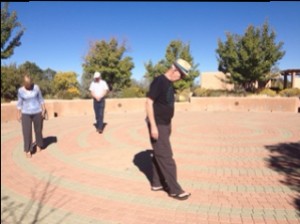I am finding it hard to be writing about the collateral pain that occurs when leaders in the Church betray trust, even though I have been living with its effects in my own soul for for 25 years. But as I wrote last week (see previous post), it has pushed me to wrestle with my faith more deeply and to begin to be able to come alongside others in the community who struggle. What a surprise it was for me to need to face some realities about life in faith community that I had assumed I knew how to handle!
- Somehow from my privileged place of comfort in the Church all my life, I did not know much about the holy work of grieving. The honest offering of one’s tears of lament in the life of the community didn’t seem quite respectable according to the lights of the theology and the ethos is which I had been formed. Grief was to be gotten over; pain was to be contained with a stiff upper lip. I wasn’t very clear about why the Book of Lamentations was included in Scripture. When I watch the community lament that is poured out on the streets of places in the world where tragedy has struck, it does not seem to be very decent and orderly, by the rubrics of household and church life. Yet I began to learn, first from wise teachers of Scripture, like Walter Bruggemann, that our tears, both individual and corporate are of interest to God, and need to be expressed. In grieving together as a community, we are able to clear out the spaces that have clogged our vision and action. When I was able to gather with friends in honest sacred conversations about our broken hearts, there was a cleansing of our own souls that created room for healing, for energy and for moving forward.
- I have learned that in human storytelling about damage, there is often not just The Truth, but many truths. The clamor for truth telling seems to be motivated by a thirst to make a judgement. When trust has been broken in a church, telling the truth is essential for a beginning to healing. However, the critical soul question for the community of the wounded is to discern how and in what way do we speak the truth in love and do what love demands for redemption and restoration. I do not need to know “details” in order to contribute to the wisdom of the body that is looking for a way through and ahead. I need to come to know my own truths when I am part of a body that has been damaged: do the facts that have been announced or uncovered prevent me from being able to worship with the congregation of which I am a part? am I allowing the story as it unfolds to reinforce prejudices or opinions that I already had? or am I resisting hearing things that I don’t want to hear because I don’t want things to change? Can I trust God to show the body of the faithful a way to navigate this tearing for the fabric of who we are?
- And so where has my trust really been placed? I need to trust my fellow congregants who have taken vows of membership and leadership to be faithful to the commitments that they have made. But, in the case of someone in ministry or leadership, have I trusted them for carrying my faith for me? Have I confused the servant of God for God, so that if she falters, God falters too?
What the Christian church and teaching tells us is that we are to be a company of forgiven and forgiving ones. How do we do that when our hearts have been broken, our trust betrayed, and we are as mad as hell? (To be continued…again!)











